December 2019 Newsletter
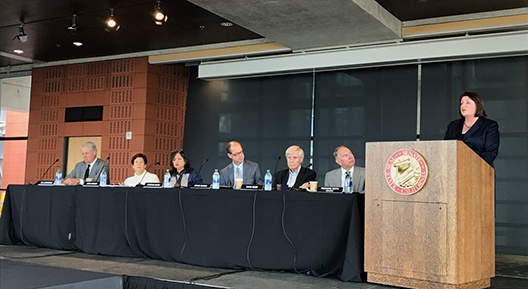 Addressing the audience at the Little Hoover Commission hearing on labor trafficking in San Diego. |
Several years ago, while I was Speaker of the state Assembly, my staff and my colleagues, working with advocates throughout the state, came up with an array of ideas to crack down on sex traffickers and to support survivors.
Many of those ideas became law – by the end of the 2015-2016 legislative session, Governor Jerry Brown had signed more than a dozen human-trafficking bills, including a major bill, SB 1322 by Senator Holly Mitchell, that requires the state to treat children caught up in the commercial sex trade as victims, not criminal prostitutes.
 That momentum has continued, and I’m pleased that two of my own sex-trafficking bills have become law — including one requiring all hotels and motels to provide their employees with training on how to recognize the signs of human trafficking and report what they see to law enforcement, and another that allows district attorneys to introduce evidence of past crimes when they’re prosecuting a trafficker, to show a pattern of preying on victims for their own profit.
That momentum has continued, and I’m pleased that two of my own sex-trafficking bills have become law — including one requiring all hotels and motels to provide their employees with training on how to recognize the signs of human trafficking and report what they see to law enforcement, and another that allows district attorneys to introduce evidence of past crimes when they’re prosecuting a trafficker, to show a pattern of preying on victims for their own profit.
California has the strongest sex-trafficking laws in the country. But our work is far from done. For example, we need more temporary housing for survivors, and expanded specialized services to help them recover from the unique type of trauma they’ve experienced.
We must also turn our attention to another form of human trafficking – labor trafficking. Labor trafficking is forcing people to work through coercion or deception, often without pay or connection to the outside world.
It’s a form of modern-day slavery, particularly problematic in industries such as construction, janitorial and cleaning services, food production, agriculture, and home care. They’re painters, carpenters, plumbers, and people who take care of our children and our seniors.
We don’t know much about how pervasive the problem is because its victims are typically reluctant to come forward, and some don’t even realize that they’re being victimized. Much more investigation needs to be done, and that’s why I was glad to help kick off the first of a series of hearings on labor trafficking in November in San Diego.
The hearings are being held by the Little Hoover Commission, an independent agency that studies state policy issues and makes recommendations to the Governor and the Legislature.
It’s entirely appropriate that the first hearing was held in San Diego. While this isn’t a problem exclusive to immigrants, our proximity to the international border and the presence of immigrants and asylum seekers makes our region a prime target for predators looking to exploit those who are vulnerable.
Among our migrant laborer population in San Diego, researchers estimate that 30% are victims of labor trafficking, and 55% are victims of abusive labor practices or gross exploitation. There are an estimated 38,000 victims in San Diego, and nearly half a million in California.
We need to better understand the scope of the problem. At the hearing, we heard from survivors of trafficking who told heart-rending stories, as well as advocates, experts, and prosecutors, who framed the issue from several angles for members of the Little Hoover Commission. It was a great first step toward collecting the information we need to address labor trafficking immediately and appropriately.
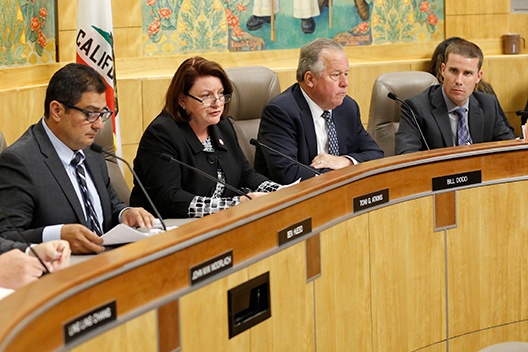 With my colleagues Senators Ben Hueso, Bill Dodd, and Mike McGuire. |
Californians deserve to know what to expect and when during a planned power shutoff, and what happens if those expectations are not met – that was my message, and the overarching theme, during a Nov. 18 Senate hearing to examine the impacts of the recent power shutoffs.
The eight-hour hearing began with San Diego Gas & Electric executives detailing how the utility developed its de-energization program following the 2003 and 2007 wildfires in our region.
Extensive public outreach, especially to those who rely on medical support equipment, and investing in technologies to reduce the number of customers impacted by a planned power shutoff became a focal point for SDG&E, which has made significant gains in guarding against wildfires.
My fellow Senators and I also heard from Southern California Edison and Pacific Gas & Electric during the hearing, which focused on gaps in critical services during power outages in those utilities’ service areas, including loss of cell service in several communities.
I served on the San Diego City Council following the 2003 and 2007 wildfires and our experience in establishing recovery and prevention protocols was a learn-as-we-go experience.
We now have a unique opportunity before us at the state level, and I’m hopeful that follow up hearings by the Senate will continue to provide insights and recommendations on how we can best address this issue.
In an op-ed for CalMatters that ran the day of the hearing, I called for the development of a comprehensive action plan that maps out documented facts, new proposals, and existing policies. The plan can help address some of our most pressing questions, such as ways to jumpstart the hardening process so more people are spared shutoffs, without taxpayers or utility customers being left on the hook.
From how to keep cell towers from failing during public emergencies and how to best deploy state assets to analyzing how we address building and insurance issues within wildfire zones during a housing crisis, there are serious, pressing questions that an action plan can help determine.
As I said during the hearing, we cannot nip around the edges – now is the time for the state to have all the options on the table.
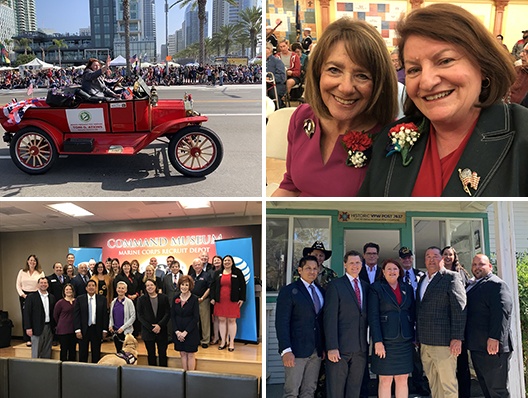 |
November isn’t great only because it brings us Thanksgiving – it also gives us a chance to honor the heroes who have served and sacrificed for our country. I was proud to participate in a number of events in San Diego that pay tribute to our military veterans. Clockwise from top left: the Veterans Day Parade; at the LGBT Center, recognizing how retiring Congresswoman Susan Davis has been a champion for LGBTQ service members; commemorating the 75th anniversary of the Viejas VFW Post, the first Native-American VFW post in California; and joining with AT&T to recognize the efforts that numerous nonprofits make to serve our veterans. Coming from a military family, it’s always personally important for me to take part in events like these.
On November 20, the California Legislative Analyst’s Office released its Fiscal Outlook, an annual look ahead at the legislative budget process.
The forecast showed that the Legislature has been a strong steward of California’s finances. The days of the perennial budget crisis – even during good economic times – are thankfully behind us. For nearly a decade, our responsible approach of building reserves and paying down debts, while also making bold progress for the people of California, has strengthened our state.
As we begin work on the next budget, we will continue to focus on responsible planning, while making needed new investments that improve our schools and universities, increase access and affordability to health care, combat poverty and homelessness, protect our environment and natural resources, and strengthen California’s wildfire preparedness and response.
I want to hear from you. If you have thoughts on the budget or legislative process, please contact my office at 619-645-3133.
|
Holiday Open House |
 |
|
Social Media Corner |
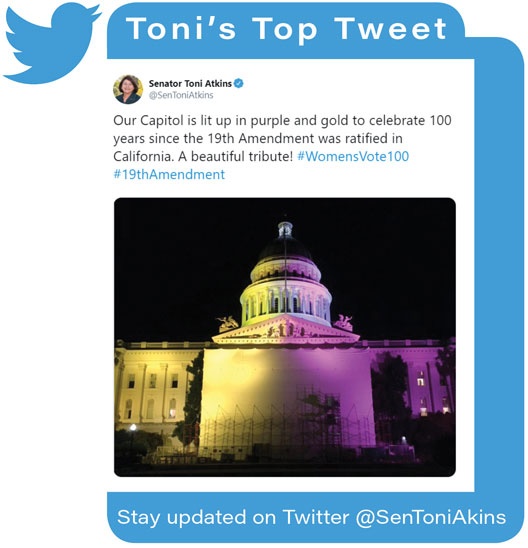 |
|
Thank You to My Interns! |
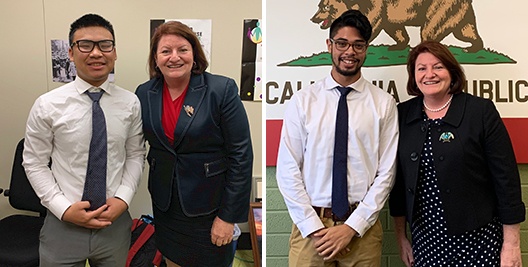 |
During the fall semester, the people of the 39th Senate District benefited from the hard work of interns Way Hlaing, who attends E3 Civics High School (left) and Alexander Serrano, who attends UCSD. I am grateful for their efforts!
My district staff is always available to help constituents navigate a complex web of state agencies. If you’re having trouble working out an issue with any state agency, please call my office at 619-645-3133, and my staff will do everything in their power to help.
My District Staff
- Pamela Ison: District Director
- Deanna Spehn: Policy Director
- Jason Weisz: Senior District Representative
- Toni Duran: District Representative
- Chevelle Tate: District Representative
- Diana Lara: District Representative
- Miller Saltzman: District Representative
- Tylisa Suseberry: District Scheduler
- David Rolland: Director of Media and Editorial
District office: 1350 Front St., Room 4061, San Diego, 92101
On the web: senate.ca.gov/atkins
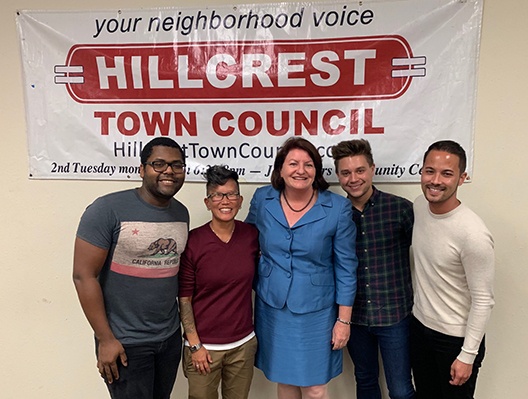 I always love visiting my friends in Hillcrest. In November, I joined their Town Council meeting to give the latest update from the Legislature. |
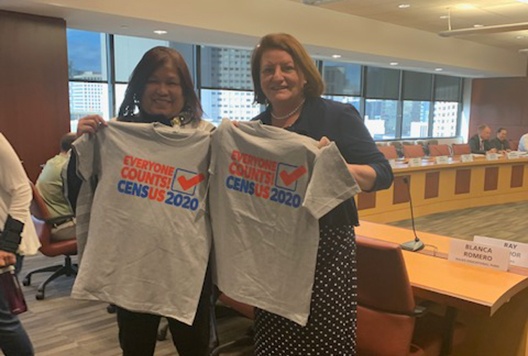 It was important for me to personally attend SANDAG’s Complete Count Committee meeting and thank the members for all they’re doing to make sure every San Diegan is counted in the 2020 Census. |
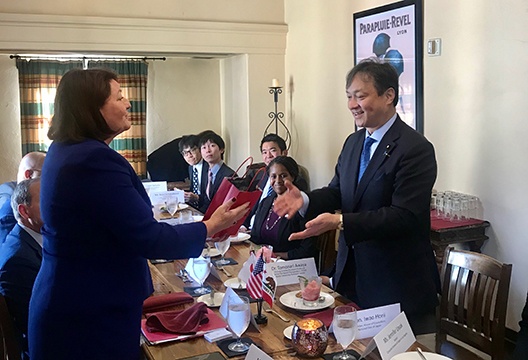 It was an honor to reconnect with Senator Iwao Horii from Japan and welcome the Japanese business delegation to San Diego. |
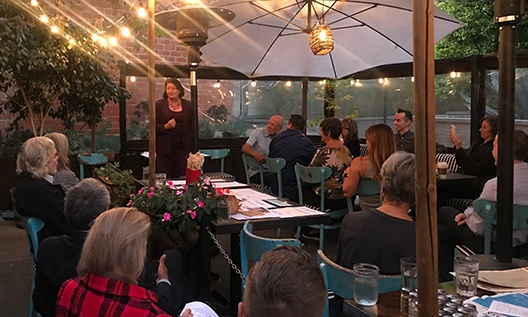 I was glad to join the Mission Hills Business Improvement District and talk about issues affecting small businesses. |
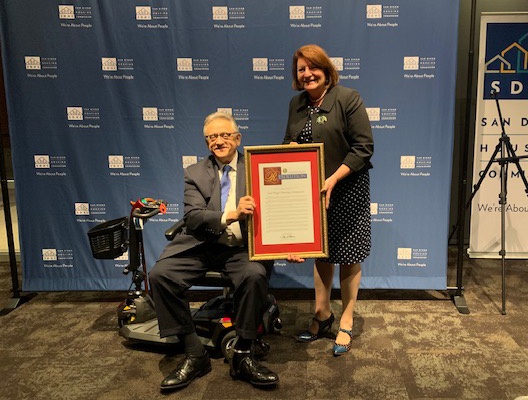 It was a pleasure to celebrate the San Diego Housing Commission’s 40th anniversary – four decades of providing housing opportunities for struggling San Diegans. |
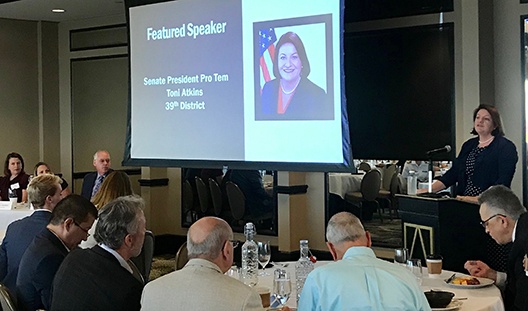 Stopped by the Downtown San Diego Partnership board meeting to talk about the progress we made in the Capitol this year. |
